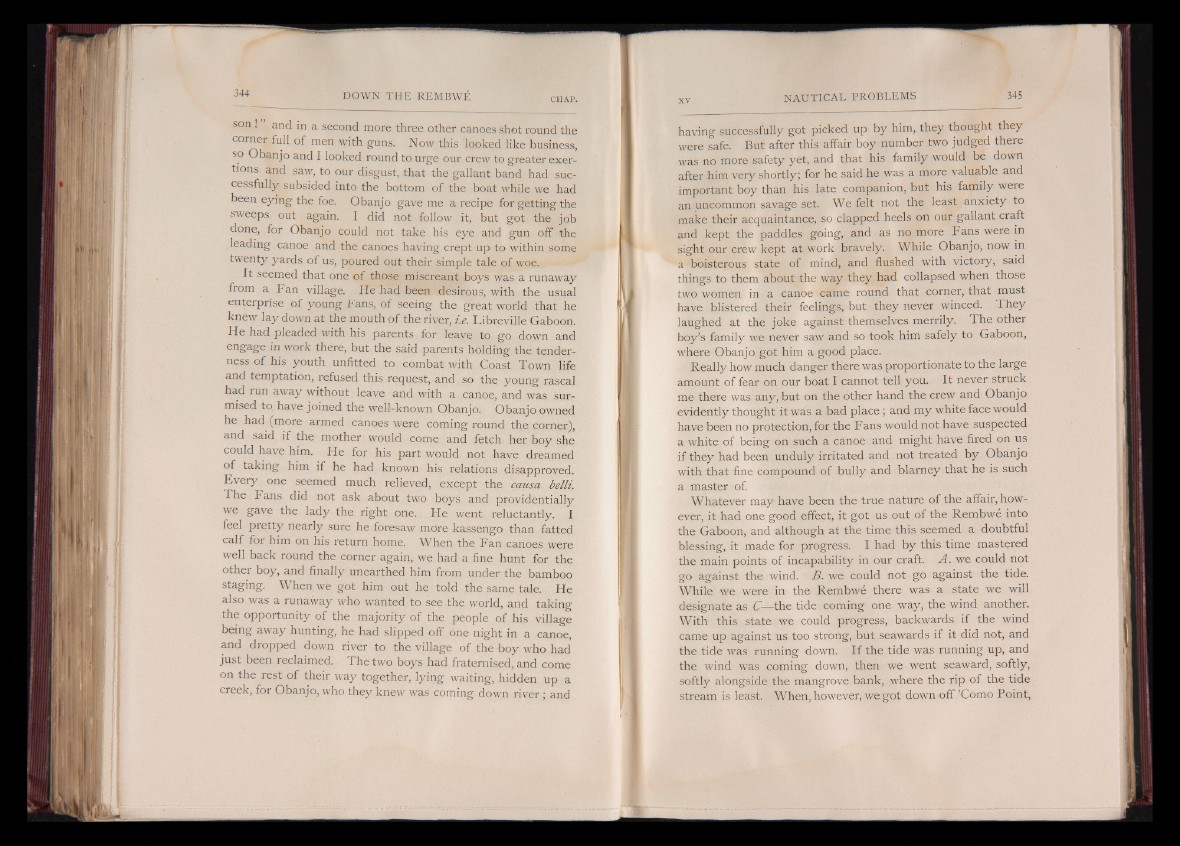
son ! and in a second more three other canoes shot round the
corner full of men with guns. Now this looked like business,
so Obanjo and I looked round to urge our crew to greater exertions
and saw, to our disgust, that the gallant band had successfully
subsided into the bottom of the boat while we had
been eying the foe. Obanjo gave me a recipe for getting the
sweeps out again. I did not follow it, but got the job
done, for Obanjo could not take his eye and gun off the
leading canoe and the canoes having crept up to within some
twenty yards of us, poured out their simple tale of woe.
It seemed that one of those miscreant boys was a runaway
from a Fan village. He had been desirous, with the usual
enterprise of young Fans, of seeing the great world that he
knew lay down at the mouth of the river, i.e. Libreville Gaboon.
He had pleaded with his parents for leave to go down and
engage in work there, but the said parents holding the tenderness
of his youth unfitted to combat with Coast Town life
and temptation, refused this request, and so the young rascal
had run away without leave and with a canoe, and was surmised
to have joined the well-known Obanjo. Obanjo owned
he had (more armed canoes were coming round the corner),
and said if the mother would come and fetch, her boy she
could have him. He for his part would not have dreamed
of taking him if he had known his relations disapproved.
Every one seemed much relieved, except the causa belli.
The Fans did not ask about two boys and providentially
we gave the lady the right one. He went reluctantly. I
feel pretty nearly sure he foresaw more kassengo than fatted
calf for him on his return home. When the Fan canoes were
well back round the corner again, we had a fine hunt for the
other boy, and finally unearthed him from under the bamboo
staging. When we got him out he told the same tale. He
also was a runaway who wanted to see the world, and taking
the opportunity of the majority of the people of his village
being away hunting, he had slipped off one night in a canoe,
and dropped down river to the village of the -boy who had
just been reclaimed. The two boys had fraternised, and come
on the rest of their way together, lying waiting, hidden up a
creek, tor Obanjo, who they knew was coming down river ; and
having successfully got picked up by him, they thought they
were safe. But after this affair boy number two judged there
was no more safety yet, and that his family would be down
after him very shortly; for he said he was a more valuable and
important boy than his late companion, but his family were
an uncommon savage set. We felt not the least anxiety to
make their acquaintance, so clapped heels on our gallant craft
and kept the paddles going, and as no more Fans were in
sight our crew kept at work bravely. While Obanjo, now in
a boisterous state of mind, and flushed with victory, said
things to them about the way they had collapsed when those
two women in a canoe came round that corner, that must
have blistered their feelings, but they never winced. They
laughed at the joke against themselves merrily. The other
boy’s family we never saw and so took him safely to Gaboon,
where Obanjo got him a good place.
Really how much danger there was proportionate to the large
amount of fear on our boat I cannot tell you. It never struck
me there was any, but on the other hand the crew and Obanjo
evidently thought it was a bad place ; and my white face would
have been no protection, for the Fans would not have suspected
a white of being on such a canoe and might have fired on us
if they had been unduly irritated and not treated by Obanjo
with that fine compound of bully and blarney that he is such
a master of.
Whatever may have been the true nature of the affair, however,
it had one good effect, it got us out of the Rembwe into
the Gaboon, and although at the time this seemed a doubtful
blessing, it made for progress. I had by this time mastered
the main points of incapability in our craft. A . we could not
go against the wind. B. we could not go against the tide.
While we were in the Rembwe there was a state we will
designate as C— the tide coming one way, the wind another.
With this state we could progress, backwards if the wind
came up against us too strong, but seawards if it did not, and
the tide was running down. I f the tide was running up, and
the wind was coming down, then we went seaward, softly,
softly alongside the mangrove bank, where the rip of the tide
stream is least. When, however, we got down off ’Como Point,